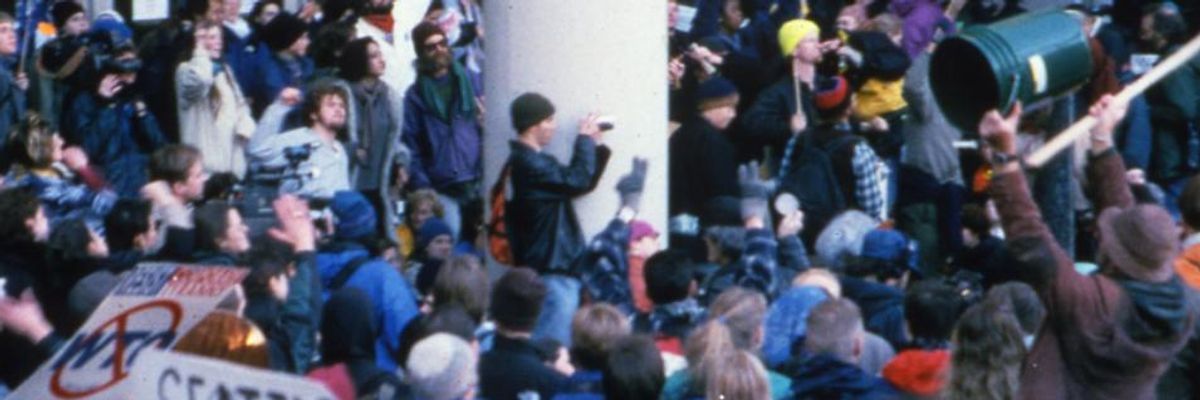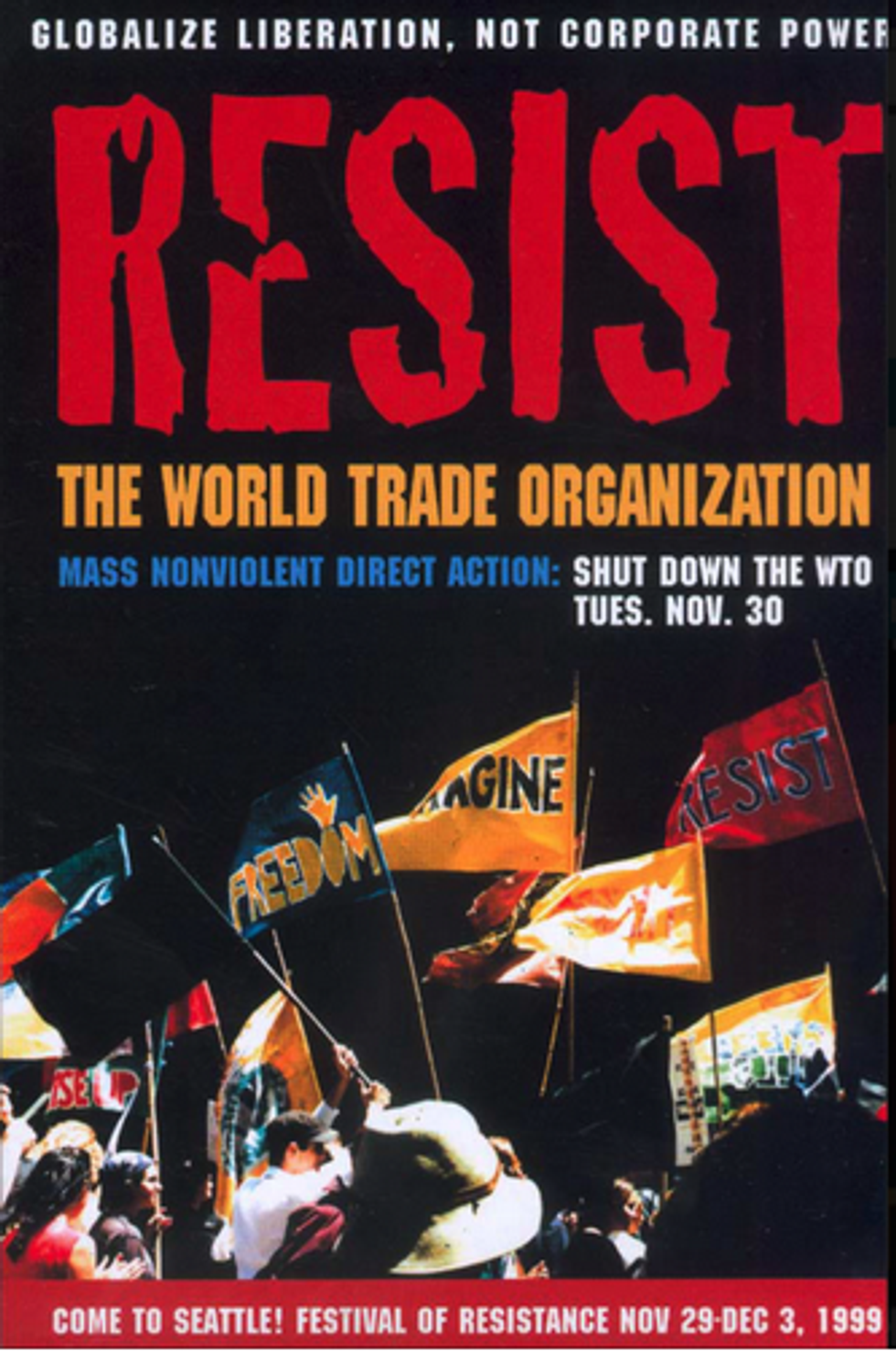It is imperative that we remember what happened in Seattle 20 years ago. We are living in a moment of mass uprisings around the world. Today's political moment traces back to many turning points in political, economic, and social movement history. In order to face the crises of today and chart our paths forward, we have to remember, reflect on, and understand ourselves within a continuum of people's movements. The Battle of Seattle was a key turning point on the cusp of the 21st century, and there is no better moment to remember the lessons and carry forward bold visions of resistance.
"Based on the last 20 years of movements rising and counter-movement attacks, what can we anticipate and plan over the next 20 years? Vision requires memory, and the lack of vision is a hindrance to strategy."
Several organizers--we are two--who were part of founding the Direct Action Network (DAN) have compiled an Organizers' History of the World Trade Organization Shutdown in 1999 to commemorate and remember the events of twenty years ago. The website includes organizing materials that we created and used at the time to educate, mobilize, and train thousands of people who came out to oppose the corporate globalization represented by the World Trade Organization (WTO). The site includes analysis, lessons, and reflections that have been written and shared over the last twenty years. We center the voices of people who were there and helped make it happen. The purpose of the site is to lift up the fundamental organizing mechanics, identify the missteps in order to improve our future efforts, and recognize the impact of movement actions on global systems.
In 1999, global movements had been organizing for decades to contend with the effects of neoliberalism and austerity. U.S.-based social movements had been fragmented by state-led attacks throughout the 1960s and 1970s. The global economic system had mutated into a new era of capitalist globalization through agreements such as the General Agreement on Tariffs and Trade (GATT), the North American Free Trade Agreement (NAFTA), and institutions such as the International Monetary Fund (IMF). Fierce movements, especially in the global South, were fighting back from Mexico to Indonesia. Despite the fragmentation, local movements--including radical labor, young people, indigenous communities, and grassroots organizers--came together when we found out the "Millennium Round" of the World Trade Organization would be hosted by Seattle billionaires Bill Gates and Phil Knight.
On November 30, 1999, a public uprising shut down the World Trade Organization. Tens of thousands of people joined the nonviolent direct action blockade that encircled the WTO conference site, completely preventing conference meetings from dawn till dusk. Organizers held the blockade in the face of an army of federal, state, and local police making extensive use of tear gas, pepper spray, rubber, plastic and wooden bullets, concussion grenades, and armored vehicles.
In response to the successful direct action, the Washington State Governor declared a "state of emergency"--a suspension of basic civil liberties in downtown Seattle--and deployed two National Guard brigades. Martial law was declared for several days, and a "No Protest Zone" was created. Nearly 600 people were arrested.
People continued to resist throughout the week. Large numbers of Seattle taxi drivers went on strike. The firefighters' union repeatedly refused authorities' requests to turn their hoses on people. Tens of thousands of workers and students walked out of work and school, and many joined the daily mobilizations in the streets.
People across the globe took action in solidarity. Longshore workers shut down every West Coast port from Alaska to California. In India, thousands of farmers in Karnataka marched to Bangalore, and over a thousand villagers from Anjar in Narmada Valley held a procession. Three thousand workers and students rallied in Seoul, South Korea. Turkish peasants, trade unionists, and environmentalists marched on the capital city, Ankara. Thousands more took to the streets in the Philippines, Portugal, and Pakistan, and across North America and Europe. In France, 75,000 people marched in 80 different cities and 800 miners clashed with police. After five days of protests and resistance, the Seattle ministerial trade talks at the WTO conference collapsed in failure.
The bold call in 1999 to shut down the WTO, meeting for the first time on U.S. soil, was an act of global solidarity with communities across the plane that inspired the demonstrations and who were emboldened by the victory. The growing global justice movement faced challenges in the next five years, and the state response to the events of September 11, 2001, broke much of the momentum. Still, the tremendous success of the Seattle organizing continued to impact social movement development from the initiation of the World Social Forum in Brazil in 2001 to U.S. Social Forum in 2007 and 2010, the Occupy Wall Street movement in 2011, and Peoples Movement Assemblies organizing in communities across the country. Every mass demonstration in the U.S. after Seattle was impacted. Law enforcement at every level studied what we did in Seattle, learned from their mistakes, and evolved their strategies to contain and repress protests.
The 1999 WTO Shutdown is one of many movement turning points to analyze and understand. An essential method of dismantling social movements is to erase our shared history of collective action. We have a responsibility to remember, to learn from our successes and mistakes, and to contribute our lessons from Seattle 1999 to today's movements for social, economic, racial, and gender justice across the globe. Organizers need guidebooks from our experiences, and Seattle provides lessons in mass organizing, direct action, strategy, and counter-movement backlash.
An important goal of the project is to look forward. Based on the last 20 years of movements rising and counter-movement attacks, what can we anticipate and plan over the next 20 years? Vision requires memory, and the lack of vision is a hindrance to strategy. Seattle is one moment among many movement moments that we need to remember and carry forward. Given the crises we face and the urgency of our times, we cannot concede this moment to collective amnesia.
The global uprisings from Chile and Lebanon to Hong Kong and Puerto Rico over the last several months demand that U.S.-based social movements determine our role in global solidarity. As part of answering that call in a small way, a team of organizers who shut down the WTO 20 years ago offer critical reflections on our shared organizing history to support today's movements to ask and answer questions about mass organizing in the 21st century, global cross-movement relationships, and visions for a liberated world.


